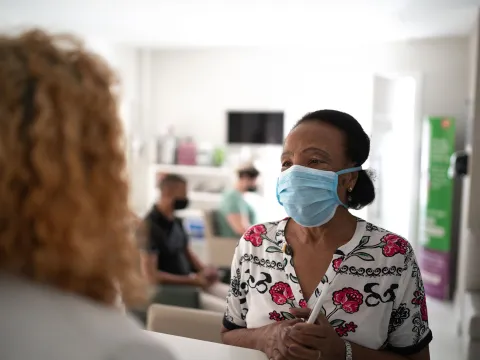- Melissa Belardo, APRN
Choose the health content that’s right for you, and get it delivered right in your inbox.
A chronic disorder of bowel function and sensation, irritable bowel syndrome (IBS) causes patients to experience bowel changes such as constipation, diarrhea, abdominal pain, bloating and rectal urgency. It is estimated to affect about 4 percent of the population and occurs more frequently in women.
IBS can significantly impact quality of life and can even be disabling, increasing job absenteeism and health expenses. It never goes away completely but can be controlled. The goal of IBS treatment is to help patients cope with the disorder and improve their quality of life. In recent years, IBS research has focused not only on effective approaches to IBS diagnosis and treatment, but also its specific impact on women, brain-bowel interaction, the role of the gut microbiome, and in just the past year, the potential impact of COVID-19.
IBS in Women
IBS affects women of all ages, and several studies have examined the higher prevalence in females and potential causes, although no definitive cause has been identified. Clinical studies have also explored the differences in IBS symptoms experienced by women and men. Some of those findings among women include:
- Increased levels of anxiety and depression
- Lower reported quality of life
- Greater fatigue
- Heightened perception of pain
In addition, women tend to experience more IBS flare-ups during their menstrual period and can also be more affected than men due to bloating and concern with body image. All of these findings point to the need for taking an individualized approach to caring for women suffering from IBS.
Brain-Bowel Interaction
In addition to gender differences, great attention has been paid to better understanding the bidirectional brain-bowel interactions that impact IBS. The enteric nervous system (ENS) is comprised of millions of nerve cells that line the gastrointestinal tract from the the esophagus to the rectum. Sometimes called the body’s “second brain,” the ENS communicates directly with the brain and plays a key role in controlling digestion.
Stress, anxiety and depression can all impact the gastrointestinal system through the ENS, triggering IBS. Likewise, IBS can also send signals to the brain, causing anxiety or depression. As a result, in treating IBS, it is critical to manage both psychological and gastroenterological symptoms. In addition, it is important to help patients identify and avoid specific triggers, whether mental or physical, so that they can regain control of their lives.
The Gut Microbiome
IBS research in recent years has also focused on the role of the gut microbiome which is made up of trillions of microorganisms, mostly bacteria, that live in the intestinal tract and are involved in proper digestion and absorption of nutrients. Disruption of the bidirectional interactions between the enteric microbiota and the nervous system caused by infections, food poisoning or other adverse life events may impact the pathophysiology of chronic gastrointestinal (GI) conditions like IBS.
Impact of COVID-19
The COVID-19 pandemic may also be affecting patients with IBS in a number of ways. For patients who already suffer from IBS, the mental and emotional stress brought on by the pandemic can trigger flare-ups of symptoms. In addition, abdominal pain, diarrhea, appetite loss, nausea and vomiting are all potential symptoms that COVID-19 patients may experience, and in some of the “long hauler” patients, these symptoms linger long after the initial infection. As mentioned before, it is well known that disruption in the gut microbiome caused by an infection can trigger IBS so it is important that COVID-19 patients experiencing these lingering GI symptoms monitor their condition and seek care if needed to address any concerns.
The Importance of Holistic, Comprehensive Care
The AdventHealth Digestive Health Institute team believes in “whole” person health. Because there is no cure for IBS, treatment aims to identify and eliminate triggers such as food and stress as well as to control specific symptoms. The diagnostic and care approach is customized for each IBS patient based on their unique health history and presentation.
Depending on the individual patient, IBS can be treated naturally or medically, or using a combination of both. Taking this comprehensive, multidisciplinary approach, customized treatment plans can include any of the following:
- Making dietary changes and offering nutritional guidance and support, including adoption of a low-FODMAP (fermentable oligo-saccharides, di-saccharides, mono-saccharides and polyols) diet. FODMAPs are specific types of carbohydrates found in certain grains, vegetables, fruits and dairy products. A low-FODMAP diet involves a process of restricting these specific foods and then slowly reintroducing them one at a time to determine if they cause symptoms. Eventually, a diet can be personalized to eliminate a person’s specific trigger foods while maintaining proper nutrition.
- Providing psychological support such as cognitive behavioral therapy to address anxiety and depression
- Exercise
- Focusing on spiritual health
- Practicing mindfulness and meditation — can include breathing exercises as well as techniques to reduce nervous system activity such as progressive muscle relaxation and guided imagery
- Complementary therapies such as gut-directed hypnosis and medical hypnotherapy. The Nerva app can be a great resource.
- Peppermint oils, pills or tea to help with digestion and to ease muscle spasms
- Ginger to ease nausea and calm gut inflammation
- Medications such as antispasmodics, anti-diarrheals, laxatives, antidepressants and pain medications
Because IBS is a chronic, long-term disorder with psychological involvement, listening to patients, building trust and carefully guiding them through both the diagnostic process and the ongoing treatment and management of their condition are critical. Close coordination with other providers such as primary care, psychology/psychiatry, and nutrition is also important.
American College of Gastroenterology Releases New Guidelines
Great strides continue to be made in better understanding IBS. In December 2020, the American College of Gastroenterology (ACG) published its first-ever “ACG Clinical Guideline on the Management of Irritable Bowel Syndrome (IBS),” providing 25 clinical recommendations for both the diagnosis and treatment of IBS. Highlights include the following:
- Diagnostic testing to rule out celiac disease and inflammatory bowel disease (IBD) in patient with suspected IBS and diarrhea
- Recommending against routine colonoscopy in patients with IBS symptoms under age 45 who do not exhibit warning signs such as unintentional weight loss, older age of onset of symptoms, or family history of IBD, colon cancer, or other significant gastro intestinal disease
- Gut-directed psychotherapies to treat overall IBS symptoms as part of a comprehensive management strategy, rather than as a last resort, that can be used in conjunction with dietary therapies and medications
- The use of tricyclic antidepressants to treat global symptoms of IBS, including its key symptom, abdominal pain
- Treatment of IBS with constipation (IBS-C) symptoms with guanylate cyclase activators and treatment of IBS with diarrhea (IBS-D) symptoms with a gut-selective antibiotic
Women Caring for Women
AdventHealth Digestive Health Institute recognizes that some women are more comfortable talking to a female provider, especially when discussing topics they may find embarrassing like bloating or bowl movements. As a result, specialized, female gastroenterology providers are available to help care for IBS patients.
To schedule an appointment or refer an IBS patient to the AdventHealth Digestive Health Institute.
Nicole Isabel Gomez Dorati, MD, is a board-certified gastroenterologist with AdventHealth Digestive Health Institute. She earned her medical degree from the University of Panama in the Republic of Panama, and completed her internal medicine residency and gastroenterology fellowship at Metropolitan Hospital, New York Medical College. Fluent in English and Spanish, her experience as a primary care physician in diverse patient populations and backgrounds inspired her commitment to whole-person care — mind, body and spirit.
Fluent in English and Spanish, Melissa Belardo, APRN, is an advanced practice registered nurse and medical educator at AdventHealth Digestive Health Institute. She received her Master of Science in Nursing from Georgetown University in Washington, DC, and is certified by the American Nurses Credentialing Center. Melissa specializes in patient education, preventive health care and chronic illness management. She practices a holistic model of care and approaches each patient by considering their physical, emotional and spiritual needs.





